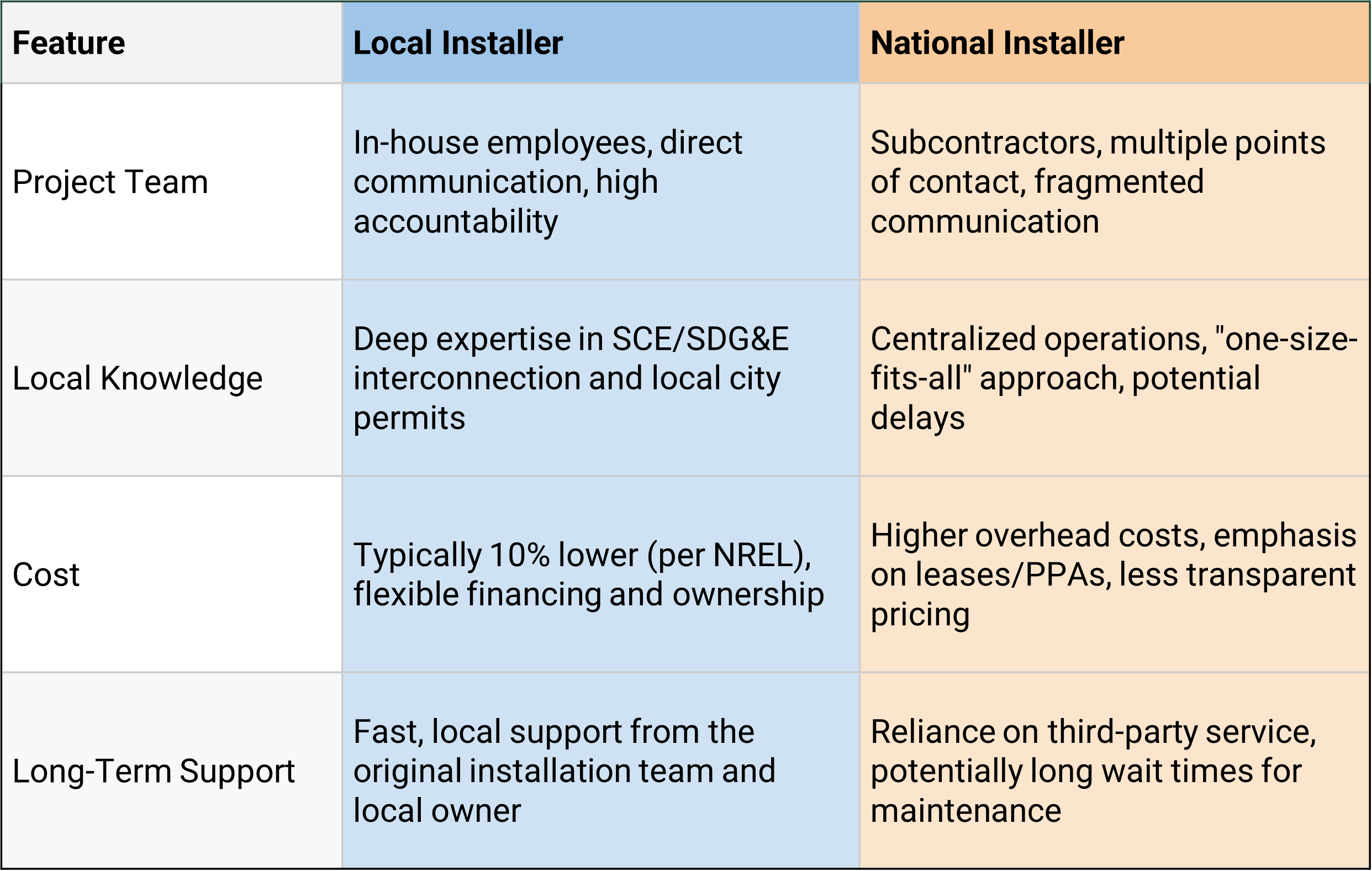Did you know that two homes with the same solar panels can have completely different results? It all comes down to one critical choice: your installer. Homeowners are faced with two main options: large national installers or locally owned companies such as OC Solar. While national companies can leverage their sheer scale to offer more extensive, multi-state warranty networks or even proprietary equipment bundles, the tradeoff for many homeowners often comes in personalized service and long-term local support.
In this post, we will break down the top three differences between national and local solar installers so you can make an informed decision with confidence.
1. Personalized Service vs. High-Volume Operations
The biggest factor separating local and national companies is who is on your roof and who you call with questions.
The Local Focus: In-House Expertise
Local installers like OC Solar prioritize quality over quantity. Their business model is built around accountability and customer relationships. This typically means:
-
- Dedicated Consultant: You deal directly with a single project consultant who understands your specific energy goals, roof type, and concerns from start to finish.
- W-2 Employees: Installation teams are typically in-house W-2 employees. They are accountable directly to the local owner, ensuring consistent high standards and quality control.
- Seamless Communication: Communication is straightforward. You know exactly who to contact for updates or if a question arises, reducing confusion and delays.
The National Approach: The Subcontracting Shuffle
National installers operate on a high-volume, standardized scale across multiple states. This centralized system often leads to less personalized, fragmented service:
-
- Multiple Departments: You may be shuffled between sales, finance, scheduling, and service departments. These departments may not personally know each other if they are spread across the country. This can lead to confusing hand-offs and repeated explanations.
- Third-Party Labor: National companies frequently outsource installation to subcontractors, external, third-party crews that have no direct loyalty to the company that sold you the system.
- Reduced Accountability: When issues arise, the lack of direct accountability between the installer, the subcontractor, and the corporate office can significantly slow down service and resolution.
The company that installs your solar is your partner for the next 25 years. Choosing a local team that is personally invested in your satisfaction is the first step to a worry-free solar experience.
2. Local Expertise and Faster Timelines
Solar installation involves more than just mounting panels on a roof; it requires successfully navigating the complex world of utility interconnection, homeowner association (HOA) rules, and city permitting. This is where local expertise drastically speeds up the process.
The Local Advantage: Cutting Through Red Tape
A local installer works in your community every day, giving them an intimate, working knowledge of the regional jurisdiction that a national company simply can’t replicate.
-
- Utility Interconnection: Local teams have established relationships and specific processes for utilities like Southern California Edison (SCE) and San Diego Gas & Electric (SDG&E). They know the required forms, application quirks, and common approval delays, leading to faster PTO (Permission to Operate).
- City & County Permits: Each city (e.g., Irvine, Anaheim, Newport Beach) has its own fire codes, setback requirements, and planning department rules. Local installers know these specific nuances, which helps them pass inspection the first time, avoiding costly re-inspections and project delays.
- HOA Approval: Many Southern California communities are governed by HOAs. Local teams are often familiar with the specific design guidelines and aesthetic requirements of common HOAs in the area, streamlining the approval phase.
The National Hurdle: One-Size-Fits-All Delays
National companies rely on centralized systems and staff who may not have specialized knowledge of your region’s unique rules.
-
- Learning Curve: Every new city or utility area represents a learning curve for the national company’s centralized permitting department, which slows down the crucial approval stages.
- Delayed Timelines: A mistake on a city application or a utility form, caused by a lack of local knowledge, can result in the installer waiting weeks for feedback, significantly extending your overall project timeline.
Choosing a local installer means selecting a team that knows the shortcuts through your local bureaucracy, ensuring your system gets installed and turned on as quickly as possible.
3. Pricing Transparency and Long-Term Support
While you might assume national scale equals lower prices, the data suggests otherwise. When analyzing quotes for the exact same equipment, national companies often come in higher than their local counterparts.
The Cost Difference: Backed by Data
The pricing advantage of a local company is often significant and verifiable:
-
- 10% Higher Cost: A study by the National Renewable Energy Laboratory (NREL), a U.S. Department of Energy research center, found that quotes from large, national solar installers are typically about 10% higher than those from local competitors for the same system.
- Lower Overhead: Local installers have a significantly leaner operating structure. They aren’t funding nationwide marketing campaigns, massive corporate structures, or commissions for an expansive multi-state sales force, allowing them to pass those savings directly to you.
- Superior Value: The lower cost doesn’t mean cheaper equipment. Local companies can offer the same premium components (like Tesla, Enphase, or SolarEdge) at a lower final price, maximizing the financial return on your investment.
Financing: Ownership vs. Standardization
Beyond the initial price, the financing options also differ significantly.
-
- National Focus (Leases/PPAs): National companies often prioritize standardized models like Power Purchase Agreements (PPAs) or leases. While PPAs can be a great fit for homeowners who prefer predictable monthly payments and no upfront costs, they are not the only solution.
- Local Focus (Flexible Loans): Local companies typically offer a wider range of transparent, flexible loan options, often partnering with regional credit unions or local banks. This gives you more control over the asset and helps ensure you retain the maximum long-term benefit and property value.
By choosing a local company, you are choosing a partner whose financial model prioritizes your long-term ownership and savings, not just their next quarterly earnings report.
Why Homeowners in Southern California Choose Local

Choosing a local solar installer like OC Solar isn’t just a business transaction; it’s about choosing a partner who understands your specific home and community.
You’re investing in a system that will be on your roof for decades. That level of reliability requires local care. Local companies are deeply rooted here—we live and work in the same neighborhoods as our customers, which fosters a genuine commitment to quality and transparency. If a storm hits Orange County or you need an inverter checked next decade, you know the people you call will be here to answer.
Don’t risk your long-term energy savings on a company that sees your home as just another number. Choose a local team invested in your success.
Final Thoughts
Both national and local solar companies offer unique advantages. Large national brands provide extensive resources, standardized pricing, and broad name recognition that can be reassuring for some homeowners. Local companies, on the other hand, offer personalized service, local expertise, and a deeper commitment to their communities. The best choice depends on your priorities, whether you value nationwide reach or hands-on support from a team that knows your neighborhood.
Don’t settle for a centralized solar experience. Choose the accountability, expertise, and proven value that only a local installer can provide. Contact OC Solar today for your personalized, free, no-obligation consultation.

